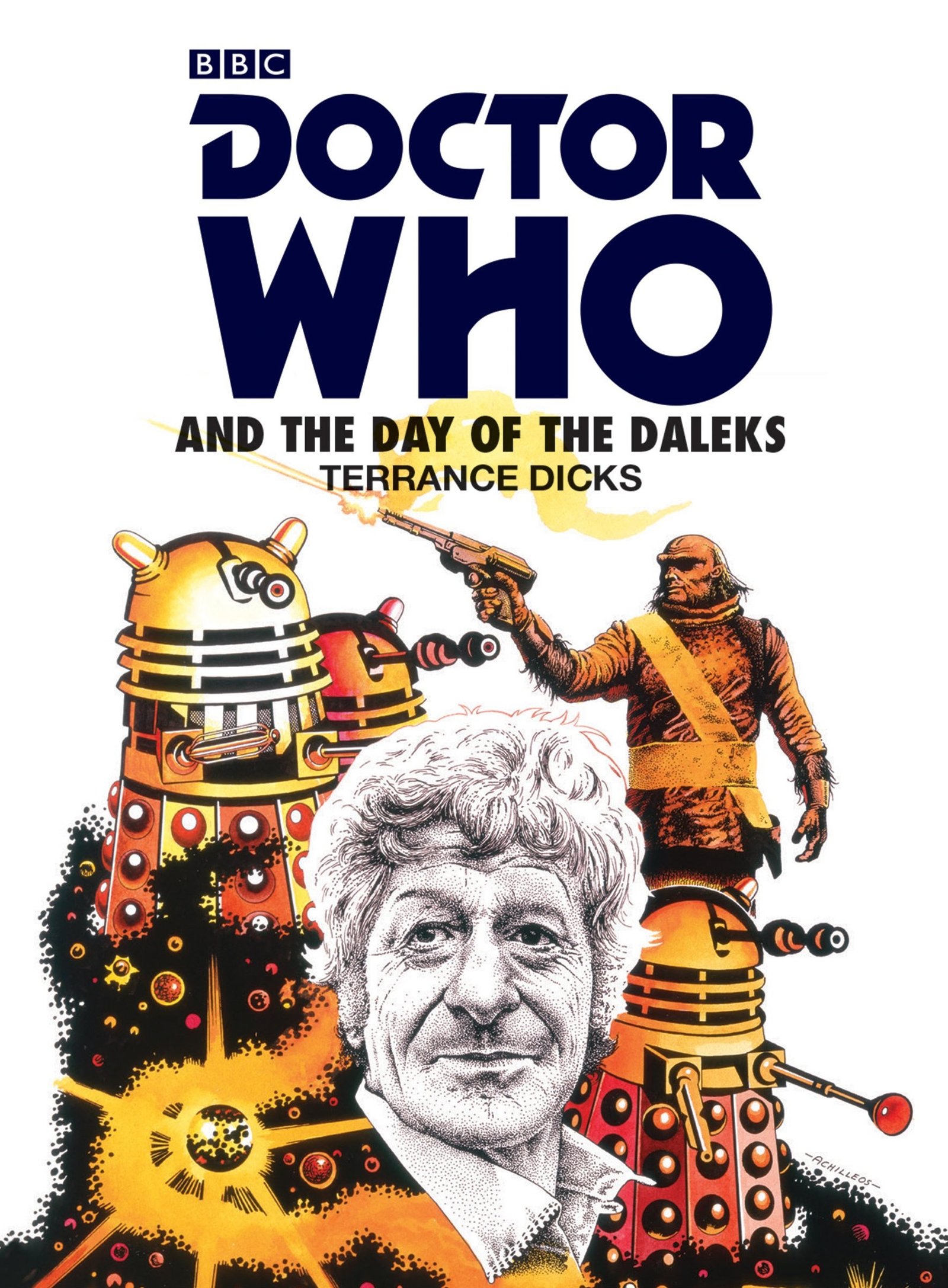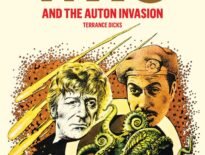Doctor Who and the Day of the Daleks is one of the best of the Target novels. You will be amazed to hear that it is based on the television story entitled Day of the Daleks. I can remember its first broadcast, even though I was still at primary school; I found it absolutely entrancing and didn’t then notice that the Daleks themselves were oddly static or that their voices weren’t great, though I could see, even when tiny, that there were only three of them. I remember jumping out of my skin in Part One when the camera pulled back to reveal the gold Dalek barking “Report!” at the Controller, and wishing we’d seen more of the trundling nasties in the first episode.
And I can also clearly remember the specially shot trailer for the story. Did you know there was one? It showed a number of Daleks gliding along a railway platform as trains thundered past; it looked as though it was filmed at Clapham Junction (in south London, for our non-British readers). The final shot was of the gold Dalek (or light grey Dalek on our black and white set), filling the screen, shot from below to enhance its menace, and the caption, “Doctor Who: Day of the Daleks. Saturday, BBC1” (or something like that). You’ll have to rely on my memory from 50 years ago and take my word for it. The trailer is now long lost, joining the wealth of other junked Who material. (That it both existed and I hadn’t imagined it, and that was wiped was confirmed to me by my friend Anthony Forth of Bedford Doc Soc, far superior to me as a reliable Who historian.)
Terrance Dicks’ early novels are better than his later ones. It’s become a truism that the only way for Doctor Who fans to relive past stories before the days of VHS was to read the Target books. This is true, but it’s also reductionist: there’s more to it than that. The better Targets are genuinely worth reading, however well you know the TV versions. The audiobooks make them easily accessible when you’re driving or doing the housework. Terrance devoured books as a child and read English Literature at Cambridge; he immersed himself in words and that became his apprenticeship as a novelist. If you don’t read, you won’t be able to write. Dicks learnt at the feet of the greats.
And at the feet of the classy, too: of Rider Haggard and Edgar Allen Poe and their ilk. Without soaring too much into flights of ultra-pretentiousness, it seems to me that Doctor Who as a text (if you will) belongs to the class of “not quite lit but still great stuff”. Harlan Ellison put Who in the category of “elegant trash”. It ain’t Dickens, or Austen, or Shakespeare, or Trollope – but it is in the same league as Conan Doyle or Bram Stoker. At its best, it’s every bit as good as the Sherlock Holmes stories (and is often better). Genesis of the Daleks is superior to the novel of Dracula as a work of popular fiction. Its relationship to the greats is a bit like the relationship of The Beatles or Queen to Beethoven or Mozart: not in the same category, not in the same league, but still very, very good. Doctor Who isn’t champagne; it’s beer.
But I like beer very much.
(I shall shut up now before I vanish into a fog of flatulent pomposity. I’m also supposed to be talking about Doctor Who and the Day of the Daleks.)

The novel is very, very well written. The prose is sparse and taught; the narrative moves at a cracking pace. It’s not faultless: occasionally, Terrance’s prose goes “clunk” and you wince. Never mind. While the book follows the script closely, the overall shape of the story feels different; the genre is more that of a long short story rather than a novel. The adaptation’s very skilfully done.
The tone is rather different too. Dicks is aware of his readership and keeps the horror in check; even so, the imagery throughout the book, and especially in the prologue – which Dicks added to Louis Marks’ script – comes from the concentration camps. There are no huddles of extras dropping rocks from a dustbin into a skip in the novel. Instead, there are human beings reduced to machines for producing output; if they don’t fulfill their quota, they starve or are beaten to death by the Ogrons. (Dicks says the Daleks could have used machines instead; the reason they don’t is that they can’t be bothered. There’s a sadistic as well as a ruthless side to the planet’s conquerors.)
You also get the impression from the novel, far more than the TV version, that the Daleks are hidden, secluded, and secretive. They’re rarely seen by ordinary people, or even by the higher echelons in their control centres (described by Dicks as rough slabs of concrete thrown up without regard to aesthetics or to anything beyond their function). Few are allowed to speak with the Daleks; it’s almost as though they are images of pagan gods, housed deep in the labyrinths of their temples, they lurk in the innermost chambers of their bunkers, and are not to be approached by ordinary mortals.
And they terrify. Again, this is an extra layer added to the TV version: the dread that the Daleks inspire. The Ogrons, the humans, the cold young women working the computer terminals, even the Controller: all of them regard their masters with absolute terror.
The Controller’s character is expanded from the Aubrey Woods version. A fair chunk of the novel is told from his viewpoint. If the Earth has become little more than a concentration camp, the Controller is clearly its Sturmbannführer. One of the paradoxes of the evil of Nazism was how SS officers could coolly and efficiently spend a working day eliminating their fellow human beings, and yet remain loving fathers and husbands. A spark of humanity remains in the worst of us — it’s that spark in the Controller that the Doctor rekindles: through his moral outrage at the Controller’s betrayal of his people (doubtless no one had ever dared speak like that to him before; he receives it as a huge shock) and through his appeal to the shred of decency that still remains somewhere, buried deep, in the Controller’s psyche.
And it’s in the Controller’s story that we get some of the best of the book. His reaction to the Daleks’ issuing more and more impossible demands, never praising him when they are met, but simply shouting at him: more orders, more pressure, more stress. He does not know how long it will be before the Black Dalek simply loses its temper and shoots him on the spot. One particular section made a huge impression on me when, as an eight year old, I read the book after its initial release. Even now, it still sends shivers down my spine:
The Black Dalek said, “Is your report concluded?”
[Controller:] “Except for one thing. It seems likely that the human returned from the twentieth century time zone with the guerrillas. According to the patrols, it must be the man the girl spoke about. She called him the Doctor.”
He turned to leave. The Black Dalek’s voice rose almost to a shriek.
“Stop! Doctor! Did you say, Doctor?”
The Controller was astonished at the strength of the reaction. The word “Doc-tor” was pronounced jarringly in two syllables. And he could almost feel the hate in the Dalek’s voice.
Now the Golden Dalek joined in, pronouncing the Doctor’s name with the same venomous intensity.
“The one known as the Doctor is not human. He is the supreme enemy of the Daleks. He must be found and exterminated!” …
As the Controller left, their voices rang in his ears… But there was something different about those voices: they held some quality the Controller had never heard before. And as he walked from the council hall, he recognised it.
The quality was fear.
For the first time in the Controller’s experience of them, the Daleks were actually afraid.
No, it’s not Dickens or Austen. It’s not Shakespeare. It’s not great literature.
But goodness me: it really is damn good.
Doctor Who and the Day of the Daleks is available to read as part of the anthology title, The Essential Terrance Dicks: Volume One.



